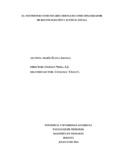El testimonio comunitario cristiano como dinamizador de reconciliación y justicia social

Fecha
2015Autor(es)
Arango Libreros, Maria ElenaDirector(es)
Neira Fernández, GermánPublicador
Pontificia Universidad Javeriana
Facultad
Facultad de Teología
Programa
Maestría en Teología
Título obtenido
Magíster en Teología
Tipo
Tesis/Trabajo de grado - Monografía - Maestría
COAR
Tesis de maestríaCompartir este registro
Citación
Documentos PDF
Resumen
El título de la monografía El testimonio cristiano como dinamizador de reconciliación y justicia social. Se trata de un trabajo de Teología Pastoral que parte de la experiencia personal de coherencia (o no coherencia) en una comunidad cristiana menonita. El problema tratado es el de la validez y coherencia del testimonio de una comunidad cristiana en el mundo moderno. Este testimonio tiene que ser personal y comunitario y tiene que empezar en la misma comunidad. El deber ser (ideal) de este testimonio es la persona de Jesús y la comunidad alternativa que Él fundó con sus discípulos, y discípulas, que se caracteriza por el amor fraterno, el servicio a los demás, el cuidado de los más pequeños, el perdón de los enemigos y la promoción de la justicia. Esto hay que vivirlo en la comunidad y proyectarlo en alguna forma en la sociedad. Para la elaboración de este trabajo se han tenido en cuenta algunas categorías (propuestas por Bernard Lonergan teólogo católico- y algunos teólogos menonitas). Estas categorías son relevantes para la actualización del testimonio en el mundo de hoy: los dinamismos de la comunidad, la promoción del bien humano, y la reconciliación que se orienta hacia una mayor justicia y paz social.
Abstract
"The title of the monograph ""The christian attestation as a catalyst for reconciliation and social justice. This is a work of pastoral theology that stems from the personal experience of coherence (or not coherence) in a Mennonite Christian community. The trouble dealt is the problem of the validity and consistency of the testimony of a Christian community in the modern world. This attestation has to be personal and community and has to start in the same community. The must be (ideal) of this attestation is the person of Jesus and the alternative community that he founded with his disciples and her disciples, which is characterized by the brotherly love, service to others, the care of the smaller, the forgiveness of enemies, and the promotion of justice. This must be lived out in the community and project it in any way in the society. For the preparation of this work it have been taken into account some categories (proposed by Bernard Lonergan - Catholic theologian - and some Mennonites theologians). These categories are relevant to the update of the testimony in the world today: the dynamisms of the community, the promotion of the human good, and the reconciliation that is oriented toward a greater justice and social peace."
Estadísticas Google Analytics
Colecciones
- Maestría en Teología [132]

